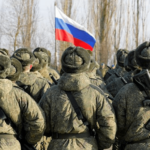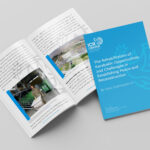On December 14, Armenian Prime Minister Nikol Pashinyan and Azerbaijani President Ilham Aliyev met at a summit in Brussels hosted by European Council President Charles Michel. The trilateral meeting was arranged following the escalation of tensions on the Armenia-Azerbaijan border, which arose between December 8-10. In a statement following the meeting, Michel confirmed that the President of Azerbaijan and the Prime Minister of Armenia reaffirmed their commitments to the Moscow-brokered ceasefire deal agreed to in November 2020. While both leaders highlighted the progress in establishing communication between the defense departments, the European Council proposed to create a platform for the development of economic cooperation and strengthening of confidence between Yerevan and Baku.
Michel called for the “full and speedy resolution of all humanitarian issues”, including the “release of further detainees and addressing the fate of missing persons.” He pledged that the EU would “support humanitarian demining efforts” and would assist “conflict-affected populations, [and] rehabilitation and reconstruction [of Karabakh].” The European Council President also welcomed the release of Armenian detainees and the handover of “all remaining” mine-maps by Armenia and called for the release of the remaining captives being held by Azerbaijan. Although Baku has confirmed the continued detention of 45 Armenian prisoners, Armenian authorities have claimed that more than a hundred soldiers remain in Azerbaijani captivity.
During the summit, Pashinyan and Aliyev agreed to take “further tangible steps” to “reduce tensions on the ground to ensure a conducive environment” for talks on delimitation and demarcation of the state border. The EU committed to providing an expert consultative group to provide technical assistance in the delimitation and demarcation process. One of the highlights of the summit was the agreement between Pashinyan and Aliyev to “proceed with the restoration of railway lines, with appropriate arrangements for border customs and controls, based on the principle of reciprocity.” Strikingly, the two leaders also had a tête-à-tête conversation for the first time after the last year’s war.
Following the meeting, both Pashinyan and Aliyev reiterated their commitments to the Moscow-brokered ceasefire agreement and agreed to unblock regional transportation and communication links. The issue of reopening the transport link between Azerbaijan proper and the exclave of Nakhchivan via Armenia; the so-called “Zangezur corridor” has long been a point of contention following the signing of the peace agreement between Yerevan and Baku. While the agreement does not specify any status given to such transport links, Baku has repeatedly demanded a “corridor” that would be under Azerbaijan’s jurisdiction. On the day of the meeting in Brussels, Aliyev said that the Azerbaijan-Nakhchivan transport link should operate similarly to the Lachin corridor connecting Armenia and Karabakh. Russian peacekeepers have been deployed along the Lachin corridor since the signing of the November ceasefire agreement to guarantee secure passage between Armenia and Karabakh.
While agreement from both leaders seems to be yet another positive sign in the reconciliation process between Yerevan and Baku, the disagreements between them showed that the issue of the status of the Azerbaijan-Nakhchivan transport link via Armenia is not yet solved. For instance, during a press conference following a meeting with NATO Secretary-General Jens Stoltenberg in Brussels, Aliyev stated that there should be no border control or customs along the corridor and Azerbaijan “should be provided unrestricted access” to its exclave. In his response on Facebook, Pashinyan stated that the attempts by the president of Azerbaijan to “draw parallels between the opening of regional communications and the Lachin corridor have nothing to do with discussions held and statements signed on that topic to date.” He stated that Aliyev tried to “to come to a dead-end in the issue of opening regional communications.”
The Brussels Summit can be considered as a small but successful step towards reconciliation between Armenia and Azerbaijan. Nonetheless, the meeting has once again shown that several issues remain unresolved. While both leaders verbally confirm their commitment to the ceasefire agreement, they need to take tangible steps with regard to border demarcation and delimitation, the status of the “Zangezur corridor” and the issue of Armenians detained in Azerbaijan. The role of Turkey, a staunch supporter of Azerbaijan is crucial in this regard. The talks held in Brussels coincided with moves to normalize relations between Armenia and Turkey as Turkey’s Foreign Minister Mevlut Cavusoglu said on Monday that Turkey and Armenia would name special envoys to discuss normalization. The foreign minister also stated that charter flights between Istanbul and Yerevan would be resumed. In response to Cavusoglu’s statement, the Armenian Foreign Ministry stated that “Armenia has always been and remains ready for the process of normalization of relations with Turkey without preconditions” and that they “assess positively” Turkish minister’s statements.
Image Source: The Armenian Weekly

